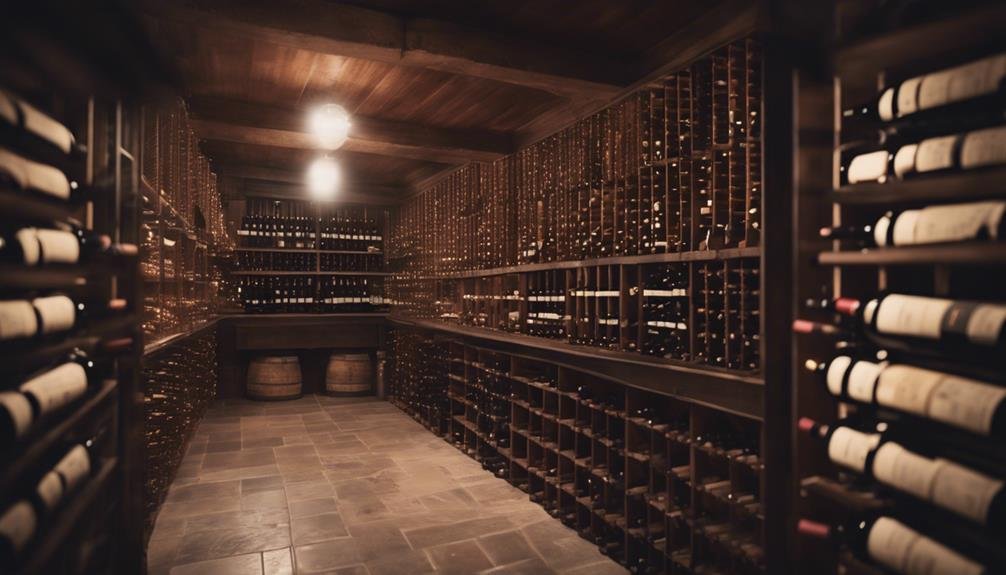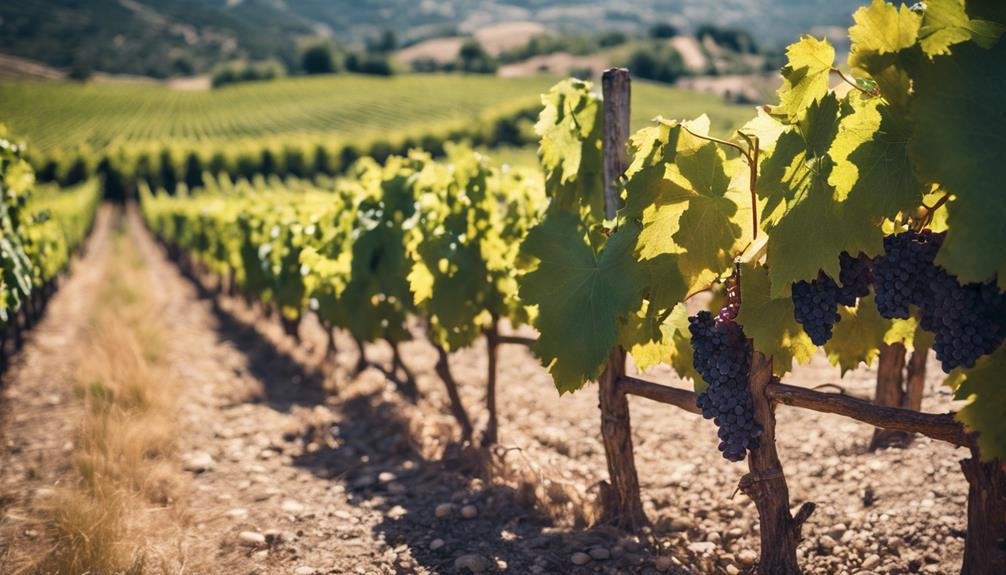Mencía wine highlights unique terroir influences with hints of strawberry, raspberry, and black licorice flavors. Its mineral undertones and peppery notes add complexity, complemented by a deep red hue. Aged wines develop a refined structure, while young ones burst with vibrant fruitiness. Pair with meats like steak and duck, or cheeses such as Manchego for an enhanced experience. Grown in regions like Bierzo and Valdeorras, Mencía's vineyard origins play an essential role in its premium quality. Discover the layers of Mencía's delights through its sensory journey of flavors, aromas, and aging potential.
Why Mencía Stands Out
Mencía distinguishes itself in the world of wines due to its unique flavor profile, exclusive growing regions, and remarkable aging potential.
Uncovering Mencía's allure reveals its terpenoid treasures, contributing to its distinct floral aromas and rich taste. This medium-bodied red wine grape, primarily found in Spain and Portugal, offers a delightful blend of strawberry, raspberry, and black licorice flavors, complemented by a significant minerality and peppery undertones.
With a deep red color and hints of violet, Mencía stands out for its ability to age like other fine wines, evolving in complexity over time. From the hillside vineyards of Bierzo to the southern-facing slopes of Valdeorras, Mencía's growing regions play an essential role in crafting wines with unparalleled character and depth.
Taste the Terroir of Mencía
Exploring the spectrum of flavors and aromas in Mencía wines provides a direct window into the unique terroir of its growing regions. The sensory experience of Mencía wines reveals a distinct taste profile influenced by the specific climate, soil, and topography of Bierzo, Valdeorras, Ribera Sacra in Spain, and Dão in Portugal.
These regions offer a diverse range of characteristics, from the floral and red fruit flavors to the deep red color with hints of violet. The peppery notes of sour cherry, red currant, and pomegranate, along with the subtle minerality, reflect the individuality of each terroir.
Unlocking Mencías Aging Potential

To fully appreciate the potential for aging in Mencía wines, it is essential to understand the key factors that contribute to their development over time. Exploring techniques such as oak aging can greatly impact the aging process of Mencía wines, enhancing their complexity and allowing for the development of more nuanced flavors.
When comparing young Mencía wines to aged ones, the transformation is remarkable. Younger wines may showcase vibrant fruit flavors and floral notes, while aged Mencía wines often exhibit a more refined structure with integrated tannins and a harmonious balance of fruit, acidity, and earthy undertones.
Wine comparisons between different aging periods can provide valuable insights into the evolution of Mencía wines and the rewards of patience in revealing their full potential.
Mencías Perfect Food Pairings
Enhancing the culinary experience, pairing Mencía wines with complementary dishes elevates the overall enjoyment of this medium-bodied red wine. Mencía's flavorful combinations include meat dishes like steak, barbecue, duck, and roast pork, enhancing the flavors of peppery, meaty dishes.
Cheeses such as Monterey Jack, Manchego, and Idiazabal complement Mencía's rich aromas and taste profile. Herbs and spices like black pepper, nutmeg, and garlic accentuate the wine's peppery flavors.
Vegetables like mushroom risotto, bell pepper, and artichoke provide excellent culinary matches, enhancing the overall tasting experience. The diverse taste profile of Mencía makes it versatile for pairing with a wide range of foods, offering wine enthusiasts an opportunity to explore different culinary combinations.
Exploring Mencías Vineyard Origins

Delving into the vineyard origins of Mencía reveals a rich tapestry of historic winemaking regions in Spain and Portugal.
- Diverse Terroir: Mencía thrives in varied terroirs, from the slate soils of Bierzo to the granitic soils of Valdeorras, influencing its unique flavor profiles.
- Traditional Vineyard Techniques: Winemakers in these regions often employ traditional vineyard techniques, such as bush vine cultivation and minimal intervention, preserving the grape's natural characteristics.
- Old-vine Vineyards: Many vineyards growing Mencía boast old vines, some dating back centuries, contributing to the depth and complexity found in premium Mencía wines.
Exploring terroir and vineyard techniques in these regions sheds light on the intricate processes that shape the distinct character of Mencía wines.
Frequently Asked Questions
Can Mencía Wines Be Used for Cooking or in Recipes?
Mencía wines can enhance dishes like steak and roast pork due to their peppery, fruity flavors. Utilize them in reductions for depth or as a marinade to complement meat. Their unique taste profile adds complexity to savory recipes.
Are There Any Specific Wine Glasses Recommended for Mencía?
When selecting wine glasses for Mencía, consider tulip-shaped, versatile flutes or elegant goblets over stemless tumblers. These shapes enhance the wine's aromas and flavors, offering a more sophisticated tasting experience that complements this medium-bodied red wine grape.
What Is the Ideal Serving Temperature for Mencía Wines?
The ideal serving temperature for Mencía wines is around 55-60°F, enhancing its floral and fruity notes while balancing its acidity. This medium-bodied red wine pairs well with meat dishes and cheeses, and its aging potential showcases evolving flavors.
How Does the Altitude of Vineyards Affect Mencía Wine Quality?
The altitude of vineyards greatly impacts Mencía wine quality. Higher altitudes offer cooler temperatures, promoting slower grape ripening, enhancing grape quality. This, combined with varying soil compositions and climate conditions, influences the flavor profile, producing wines with greater complexity and intensity.
Are There Any Organic or Biodynamic Mencía Wine Producers?
Sustainable farming practices are on the rise in winemaking. Several Mencía wine producers embrace organic or biodynamic methods, enhancing the wine's quality and respecting the environment. These natural approaches are gaining popularity among discerning consumers seeking ethically produced wines.
Conclusion
To sum up, the world of Mencía wines offers a mesmerizing journey through rich terroirs, diverse flavors, and endless possibilities.
From its distinctive taste profile to its aging potential and perfect food pairings, Mencía continues to captivate wine enthusiasts with its unique characteristics.
As you explore the vineyard origins and regions where Mencía thrives, the depth and complexity of this grape variety will keep you returning for more, excited to uncover its hidden gems and delights.
